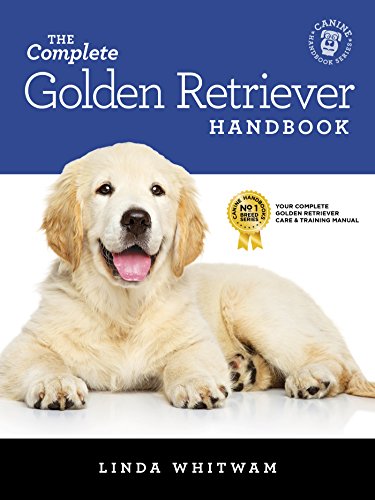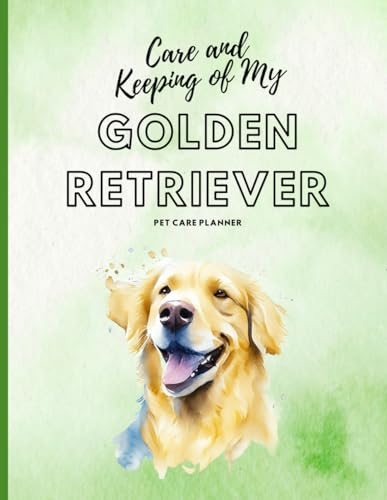Congratulations on becoming a Golden Retriever owner! As someone who has worked with thousands of dogs through dog shelters and breeders, I can tell you that Golden Retrievers are one of the most beloved dog breeds out there. However, with great love comes great responsibility.
Understanding your Golden Retriever’s health and behavior is crucial for ensuring their well-being. In this article, we’ll cover common health issues in Golden Retrievers and their symptoms, when to call the vet for your Golden Retriever, preventative care for maintaining your Golden Retriever’s health, and building a relationship with your veterinarian for your Golden Retriever’s overall well-being.
If you’re a new Golden Retriever owner looking to give your furry friend the best life possible, keep reading.
Understanding your golden retriever’s health and behavior.
As a seasoned dog expert who has worked with thousands of dogs through dog shelters and breeders, I cannot stress enough the importance of understanding your Golden Retriever’s health and behavior. While they are known for being one of the most loving and loyal breeds out there, it is important to remember that every dog is unique in their own way.
Firstly, as a new Golden Retriever owner, you should familiarize yourself with common health issues that this breed may face. This includes hip dysplasia and eye problems such as cataracts or progressive retinal atrophy. Keep an eye out for any signs of discomfort or unusual symptoms such as limping or excessive scratching.
Secondly, it’s important to understand how your Golden Retriever communicates through body language. For example, if your pup is wagging its tail rapidly while growling low in its throat – this could indicate aggression rather than excitement! Understanding these subtle cues can help you avoid potential conflicts with other dogs or humans.
Lastly but certainly not least – when should you call the vet? If your furry friend shows any signs of lethargy lasting more than 24 hours without improvement (e.g., not eating/drinking), vomiting/diarrhea lasting more than 24 hours without improvement (or bloody stools), coughing/sneezing/wheezing/abnormal breathing sounds persistently present – don’t hesitate to seek professional advice from a veterinarian!
In conclusion – educating oneself on their pet’s wellbeing will lead to happier pups and less stressful owners! Remember: prevention is better than cure so keep up-to-date on regular check-ups at the veterinary clinic too!
Common health issues in Golden Retrievers and their symptoms?
As a seasoned dog lover who has worked with thousands of dogs through dog shelters and breeders, I have come to understand the common health issues that Golden Retrievers face. While these furry friends make wonderful companions, they are prone to certain conditions that every owner should be aware of.
One of the most common health issues in Golden Retrievers is hip dysplasia. This condition affects the hip joint and can lead to arthritis or even lameness if left untreated. Symptoms include difficulty standing up after lying down, reluctance to exercise, and limping.
Another issue is ear infections. Due to their floppy ears and active lifestyles, Goldens are more susceptible than other breeds to ear infections caused by bacteria or yeast overgrowth. Symptoms include redness or swelling around the ears, shaking their head frequently due to discomfort, and an unpleasant odor coming from the ears.
Golden Retrievers also tend towards allergies which can result in skin irritation like hot spots or rashes on various parts of their body including belly area between legs paw pads eyes nose etc.. The symptoms may vary from itching licking biting themselves excessively sneezing coughing vomiting diarrhea etc..
If you notice any unusual behavior in your Golden Retriever such as excessive drooling panting lethargy disinterest in food water toys walks it’s important not hesitate calling your veterinarian right away for a check-up as early diagnosis often leads better prognosis.
These are just a few examples – but there are many other potential ailments that owners should keep an eye out for when caring for their beloved pets. Ultimately though this knowledge helps new dog owners better care for their golden retriever so they can live happy healthy lives together!

When should you call the vet for your Golden Retriever?
« mini golden retriever
Finding the Perfect Golden Retriever: A Guide to Choosing a Reputable Breeder and Healthy Pup »
As a seasoned professional who has worked with thousands of dogs through dog shelters and breeders, I understand the importance of knowing when to call the vet for your Golden Retriever. While these friendly and loyal animals are generally healthy, like all breeds, they can fall ill or suffer from accidents.
Firstly, it is important to know your dog’s baseline health. Owners should monitor their Golden Retriever’s daily habits and routines to recognize any changes in behavior or appetite. If you notice anything out of the ordinary such as lethargy or lack of interest in food for more than 24 hours, this could be an indication that something is wrong.
In addition to monitoring habits, owners should also regularly check their pet’s eyes ears teeth nose skin coat nails paws tails genitals rectum etc., looking for signs of injury or infection such as discharge odors swelling redness itching flaking bleeding bald spots lumps bumps limping difficulty breathing vomiting diarrhea coughing sneezing etc.
If you do notice any concerning symptoms in your pet it is always better safe than sorry so don’t hesitate – contact a veterinarian immediately! Early detection can often lead to quicker treatment which leads ultimately results in better chances at recovery.
Remember that while owning a Golden Retriever comes with great rewards there are also responsibilities involved including keeping them healthy happy and safe throughout their lives – so learn when best take action by calling on vets who specialize specifically treating golden retrievers before problems become irreversible!
Preventive care for maintaining your Golden Retriever’s health.
As a seasoned dog enthusiast who has worked with thousands of dogs through dog shelters and breeders, I can confidently say that preventative care is the key to maintaining your Golden Retriever’s health. While it is important to know when to call the vet for emergencies, regular check-ups and preventive measures can save you from unnecessary stress and expenses in the long run.
One of the most crucial aspects of preventive care is nutrition. A well-balanced diet that meets your Golden Retriever’s nutritional needs will keep them healthy from within. Make sure their food contains all essential nutrients like protein, carbohydrates, fats, vitamins and minerals.
Regular exercise also plays a major role in keeping your furry friend fit as well as mentally stimulated. Daily walks or runs are ideal for keeping their weight in check and preventing obesity-related problems such as diabetes or heart disease.
Dental hygiene shouldn’t be ignored either; bad breath could be an indication of gum disease which could lead to tooth loss down the line if not treated properly by a veterinarian. Brushing teeth regularly along with providing chew toys made specifically for dental health purposes are great ways to prevent any oral issues from developing.
Lastly but importantly , it’s recommended that owners schedule annual wellness exams with veterinary professionals who can detect early signs of illness before they become serious problems.

In conclusion: taking proper steps towards preventative care will ensure a happy life for both you and your furry companion- one filled with lots belly rubs , tail wags ,and peace-of-mind knowing they’re being taken care of correctly!
Building a relationship with your veterinarian for your Golden Retriever’s wellbeing.
When it comes to the health and well-being of your beloved Golden Retriever, building a strong relationship with your veterinarian is crucial. As a seasoned professional who has worked with thousands of dogs through dog shelters and breeders, I cannot stress enough the importance of having a trusted vet on speed dial.
As a new dog owner, you may be unsure about when to call the vet for your furry friend. While regular check-ups are important for maintaining good health, there are certain signs that warrant an immediate trip to the clinic. These include vomiting or diarrhea lasting longer than 24 hours, sudden changes in appetite or behavior, excessive lethargy or restlessness, difficulty breathing or urinating and any injury that causes bleeding.
It’s also important to establish open communication with your veterinarian from day one. Share any concerns you have about your Golden Retriever’s diet and exercise routine as well as their overall behavior at home. This will help build trust between you and the vet while ensuring they have all necessary information needed for making informed decisions regarding treatment plans.
In addition to being proactive when it comes to veterinary care for your Golden Retriever; always remember prevention is key! Make sure they receive proper vaccinations against common diseases such as rabies & parvovirus; keep up-to-date on flea/tick treatments year-round (especially during warmer months); provide fresh water daily along with high-quality food choices appropriate based on their life-stage needs.

Above all else – love them unconditionally! Feed them healthy treats like carrots instead of sugary snacks which can lead overweight/obesity issues down-the-line if not monitored properly over time by both owner & veterinary team alike 🙂
Conclusion
Taking care of a pet isn’t easy, and owning a Golden Retriever is no exception. Knowing when to call the vet for your beloved pup can make all the difference in keeping them healthy and happy. Thankfully, knowledge on understanding their health issues, regular preventative care visits, and forming relationships with your veterinarian are all within reach! As an owner of one of these wonderful four-legged friends – or any dog really – you owe it to yourself (and to them!)to do what’s best for their well-being. Join us today as we explore more about how to maintain optimal health for your pup through preventive measures so that they can live long lives full of fun times!

















